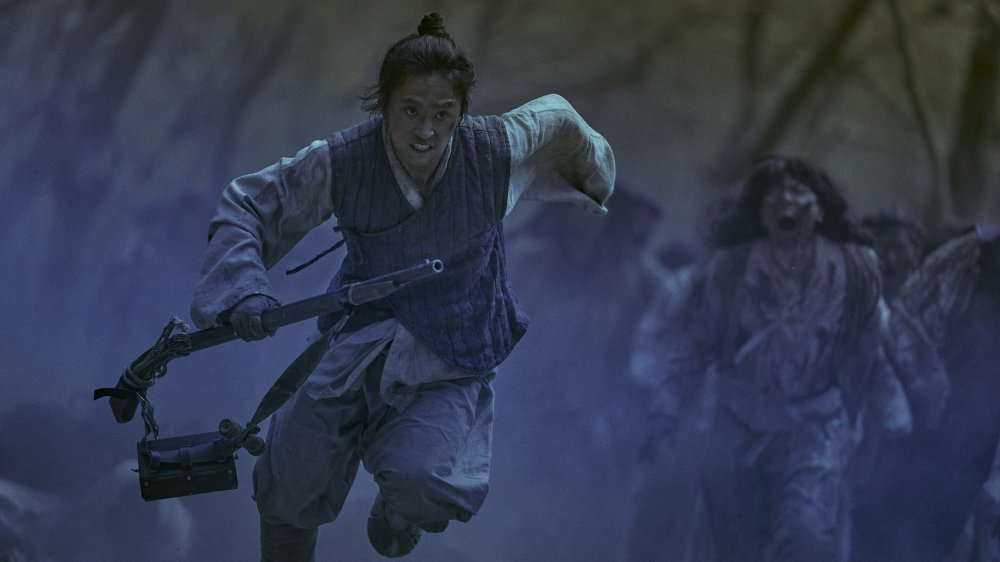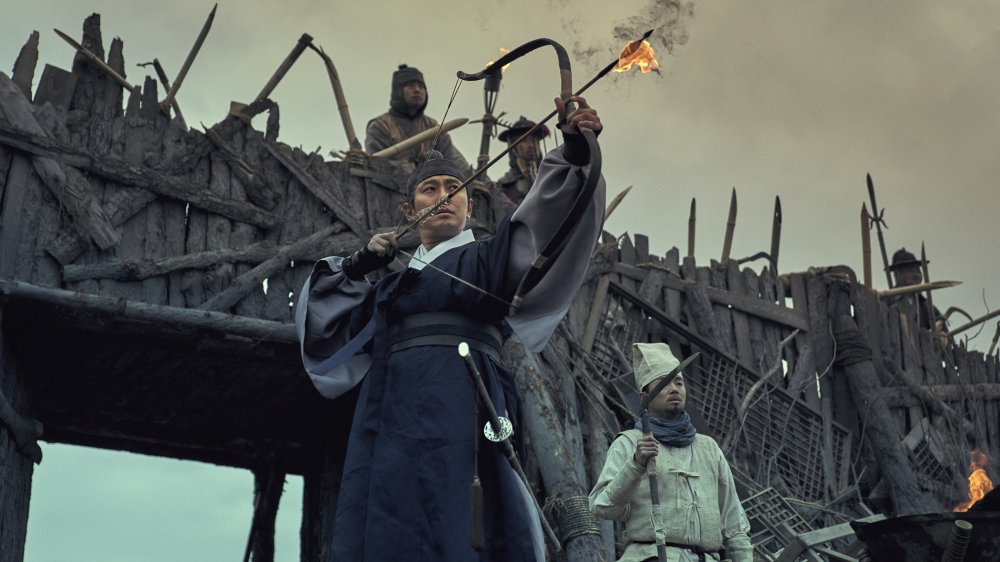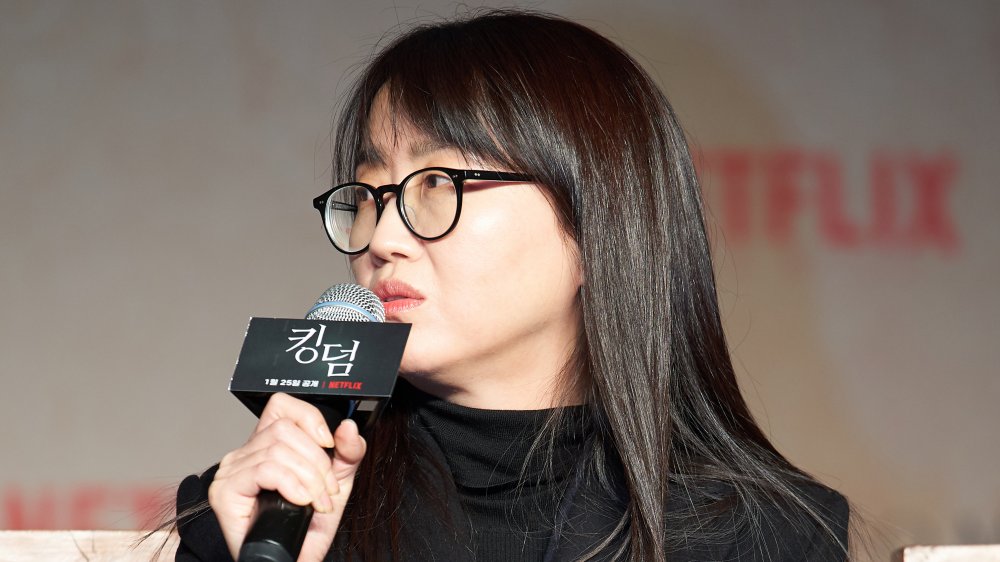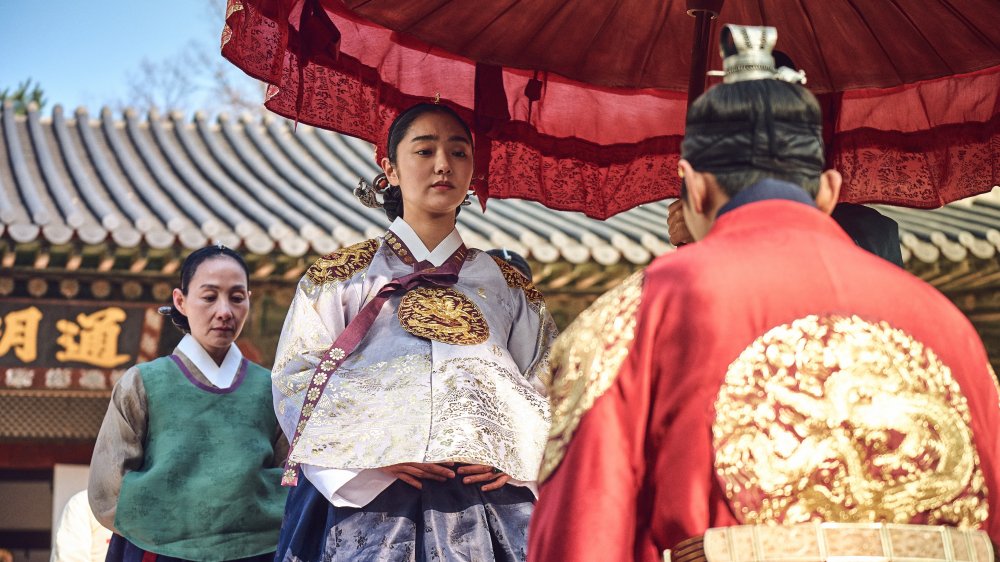The Zombie-Filled Historical Drama #Alive Fans Need To Binge On Netflix
Even though the popularity of zombie-related entertainment has worn a little thin, when an excellent movie or series about the walking dead comes out, people still take notice. Case in point: The South Korean zombie flick #Alive. The film takes the cliché setup of a world overrun with the shambling undead and gives it a distinctly modern flair thanks to its claustrophobic apartment setting and use of social media and video game streaming as narrative devices. Audiences on Netflix are clearly intrigued, as the film is currently on the streamer's list of the top 10 most-viewed movies on its platform (even though some people had a few issues).
If you caught the #Alive and it left you hungry (sorry) for more smart and innovative takes on the zombie genre, Netflix has an intriguing and underrated South Korean series you have to queue up for your next big binge. Kingdom may take place a few hundred years before #Alive, but the way it subverts tired zombie tropes makes it a fascinating companion piece — never mind that its mix of palace intrigue, historic drama, and gripping horror will have you hitting "play next episode" with the ferocity of the bloodthirsty undead.
What is Kingdom about?
Something strange is going on in the Joseon dynasty. The king has reportedly been sick with smallpox for days, and rumors of his death have cropped up all over the countryside, which has already been ravaged by famine and unrest. Nobody is allowed to see him — not even his son, the Crown Prince Lee Chang (Ju Ji-hoon). The prince suspects the King's pregnant wife, the Queen Consort Cho (Kim Hye-jun), of attempting to use the turmoil of his father's illness to wrest away the throne that is rightfully his. In order to get to the bottom of everything, Lee travels to the south of the country to uncover the truth about his father's illness.
Lee's investigation leads him to a horrifying discovery: The king does not have smallpox, but, is in fact afflicted by a mysterious plague that has been tearing through the southern reaches of the kingdom. The illness has been bringing the dead back to life as bloodthirsty fiends. Soon, Lee's investigation has him caught between packs of undead ghouls and a treacherous conspiracy of politicians and royal insiders who want him out of the way.
Kingdom's story comes from a celebrated South Korean writer
The historically-rich and compelling story of Kingdom got its start in a graphic web series called The Kingdom of the Gods, which has since been compiled and translated into English. The comic has a similar premise to that of the TV series — a young prince who must battle against both political and undead enemies — and was written by Youn In-wan with Yang Kyung-il doing the illustrations. The story of The Kingdom of the Gods came from Kim Eun-hee, who is a prominent screenwriter in South Korea. In fact, when Netflix first announced its Kingdom series, they referred to her and the series' director, Kim Seong-hun, as "two of Korea's strongest storytellers."
Kim has worked as a writer for several South Korean TV series, the most recent before Kingdom being Signal, a sci-fi police procedural about a detective in the 1980s who stumbles upon a walkie-talkie that allows him to communicate with cold-case detectives in the present day. The show was a massive success, breaking ratings records (via The Korea Times) and scooping up accolades at the Baeksang Arts Awards, one of South Korea's top honors for film and TV. Signal won Best Drama Series and Kim won the award for Best Television Screenplay.
Kingdom's historic details are incredible
If you love a lush costume drama, then get ready, because Kingdom spares no expense on the outfits and set design. The series is set in a fictionalized version of the Joseon Period, which lasted from the 14th to the 19th centuries. In a Variety profile of the artisans who worked on the show, Kingdom's costume designer, Kwon Yoo-jin, explained the ethos behind the show's lush aesthetic: "We based the costumes on historical research ... and then added some modifications in the designs to make them look the most profound and graceful on camera."
Costumes and sets aren't the only ways in which Kingdom brings its historic settings to life. The show takes place during a period of extreme hardship and famine. Screenwriter Kim saw an opportunity to use the trope of zombies to highlight the emotional turmoil mass hunger can inflict on a nation. She told Soompi she looks at the idea of the walking undead as more tragic than terrifying: "I thought they were sad beings with a remaining strong instinct to eat." She went on to add, "I thought that if you take the 'epidemic disease,' which is very contagious, and bring it to the miserable Joseon Dynasty, there could be an ironic story."
Kim even offered some historical context for why Kingdom went with quick and agile zombies, versus the more classic shambling undead: "I wanted to express hunger. If a family with a large number of members fights for a small fish, they must be quick. So even though they turn into zombies, the behaviors are similar ... I hoped this kind of image would be seen with sadness."
If any of that caught your interest, then there's good news: There are currently two seasons of Kingdom available to stream on Netflix.



